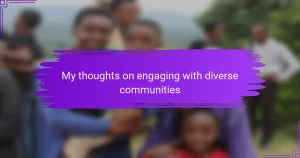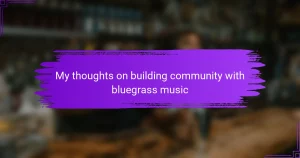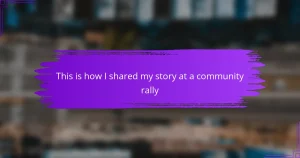Key takeaways
- Youth mentoring in politics nurtures potential and fosters active citizenship, empowering young individuals to realize their voices matter.
- Building trust and encouraging active participation lead to meaningful experiences, transforming confusion into curiosity and confidence.
- Mentoring relationships thrive on shared vulnerability and authentic connection, emphasizing patience in witnessing growth and development.
- Future mentoring goals include creating sustainable spaces for youth to lead and adapt approaches to meet the unique challenges of each mentee.
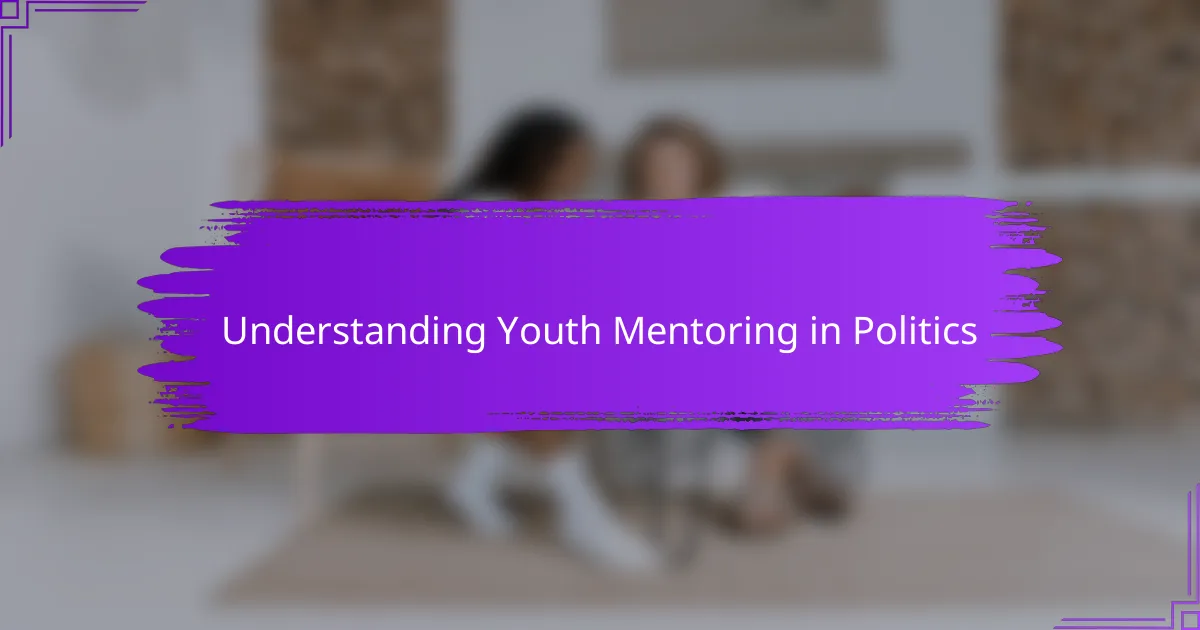
Understanding Youth Mentoring in Politics
When I first stepped into youth mentoring in politics, I quickly realized it’s more than just sharing knowledge; it’s about nurturing potential and sparking a fire for change. Have you ever noticed how a simple conversation can shift a young person’s outlook, making the complex world of politics feel accessible and even exciting?
Mentoring isn’t just about teaching facts—it’s about listening deeply to the hopes and fears of young individuals. I’ve found that building trust creates a space where ideas flow freely, and that connection often leads to powerful growth on both sides. It’s fascinating how mentoring becomes a two-way street, enriching my understanding as much as theirs.
What struck me most was how mentoring in politics helps to shape not just future leaders, but active citizens who feel empowered to make a difference. I still remember a young mentee’s eyes lighting up after realizing their voice truly matters. Moments like that remind me why this work feels so urgent and rewarding every day.
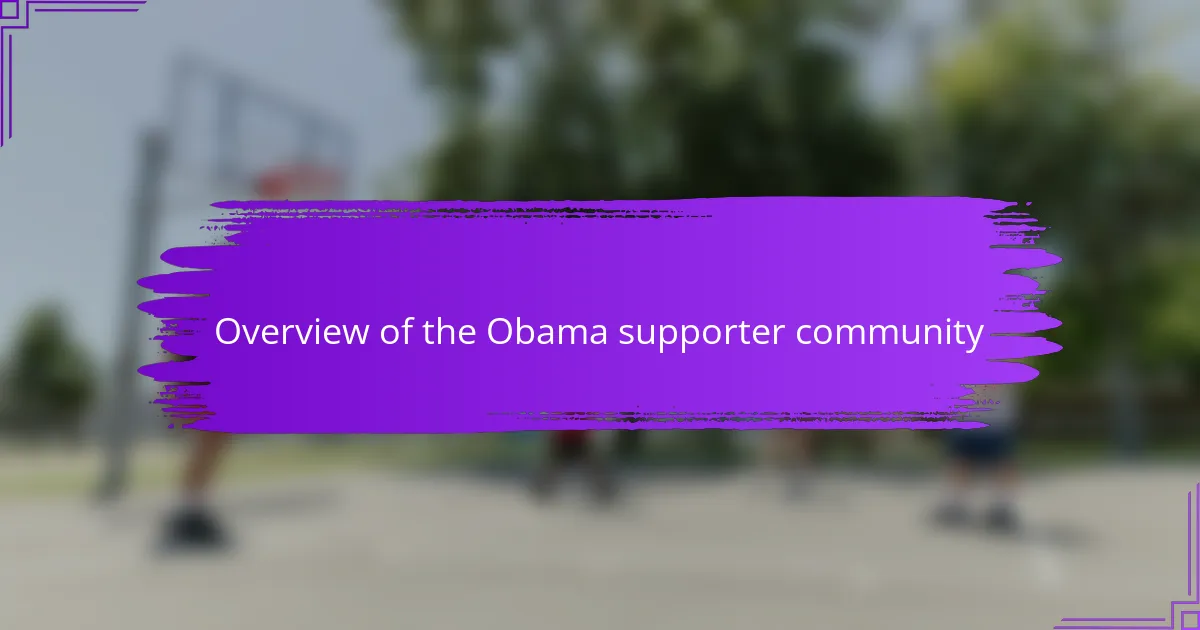
Overview of the Obama Supporter Community
The Obama supporter community always struck me as more than just a political group—it feels like a family bound by shared hope and a belief in progress. Have you ever experienced being part of a community where ideas and enthusiasm ripple through every conversation? That’s exactly how it felt for me among fellow Obama supporters, where every discussion carried a sense of purpose and possibility.
What I find truly inspiring is the diversity within this community. People from all walks of life come together, united by a vision of change and inclusion. This unity doesn’t erase our differences; instead, it sparks deeper conversations and stronger bonds, making the community a vibrant space for growth.
Being part of the Obama supporter community also means engaging in grassroots efforts that reminded me how real change is built from the ground up. I still recall the energy at local meetups—passionate debates, genuine kindness, and that feeling that we were part of something much bigger than ourselves. It’s this spirit that continues to fuel my commitment to mentoring youth in politics today.
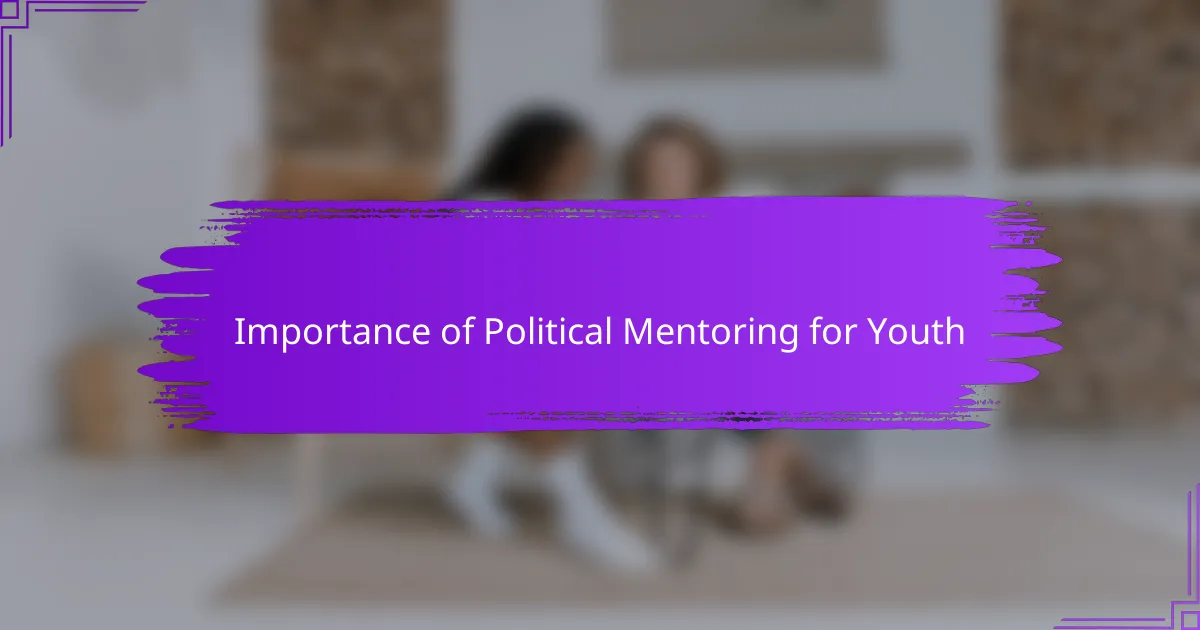
Importance of Political Mentoring for Youth
Political mentoring for youth matters because it offers guidance at a moment when curiosity meets uncertainty. I remember a young mentee once telling me how confusing and overwhelming politics seemed until we sat down and unpacked it together. That moment of clarity sparked confidence—proof that mentorship can transform hesitation into enthusiasm.
What makes political mentoring so crucial is its power to connect ideals with action. Have you considered how many young people want to make a difference but lack a roadmap? Through mentoring, I’ve seen them learn not only the mechanics of politics but also how to channel their passion into real community impact. It’s empowering in a way that books and lectures simply can’t match.
Beyond just skills, mentoring instills a sense of belonging and purpose. I often think about the quiet strength students gain when they realize they’re part of a larger movement. That realization turns political engagement from something abstract into a personal mission, fueling a lifelong commitment to change. Isn’t that the heart of what mentoring should achieve?
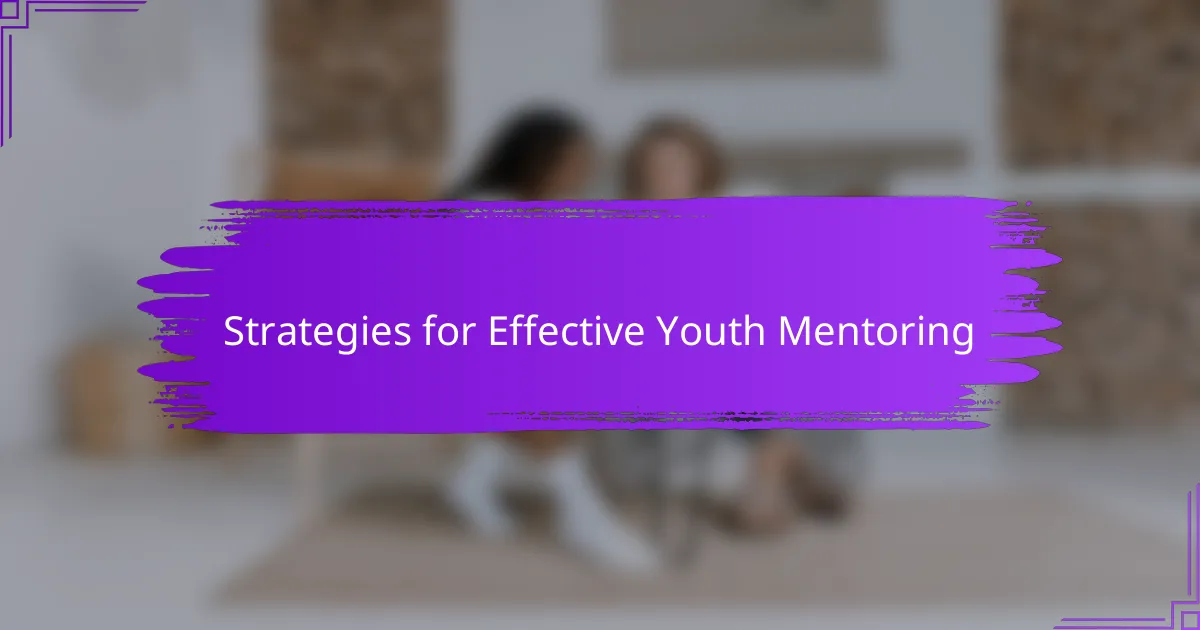
Strategies for Effective Youth Mentoring
One strategy I’ve found essential is meeting youth where they are—politically and emotionally. Have you noticed how overwhelming politics can seem to someone just starting out? By breaking down complex ideas into relatable stories or current events, I’ve seen mentees go from confused to curious, which opens the door to deeper engagement.
Another approach that worked well for me is encouraging active participation rather than passive listening. I remember inviting a young mentee to their first community meeting, and seeing their nervousness turn to excitement was priceless. When youth step into real political spaces, their confidence grows, and the mentoring relationship becomes a bridge to meaningful experience.
Lastly, nurturing a sense of ownership in the political process seems critical. How often do young people feel like politics is happening to them instead of with them? By empowering mentees to lead small projects or discussions, I witnessed a shift—from feeling like outsiders to becoming energized contributors eager to create change. It’s this sense of agency that, to me, defines effective mentoring.
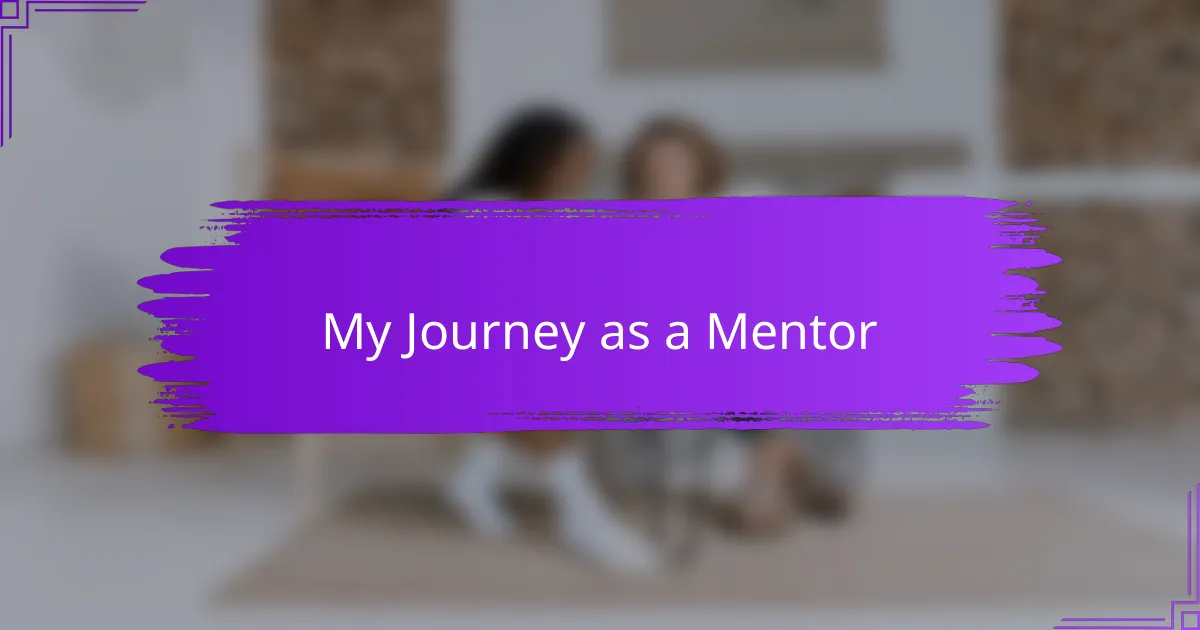
My Journey as a Mentor
Early on, I wasn’t sure how my experience would translate into mentoring youth in politics. Yet, with each conversation, I saw how sharing my journey helped illuminate paths for young people unsure of where to start. Have you ever felt the power of passing on lessons learned firsthand? It’s a humbling and energizing feeling.
There was a moment when a mentee told me that our talks made politics feel less like a distant arena and more like a place where their ideas mattered. That shift reminded me how mentorship isn’t about authority—it’s about partnership and trust. Watching that growth over time made me realize how much mentoring has shaped my own understanding of leadership.
I often wonder what it is about these mentoring relationships that leaves such a lasting impression. From my experience, it’s the shared vulnerability and authentic connection that open doors to meaningful change. It’s those moments that keep me coming back, eager to guide and learn anew.
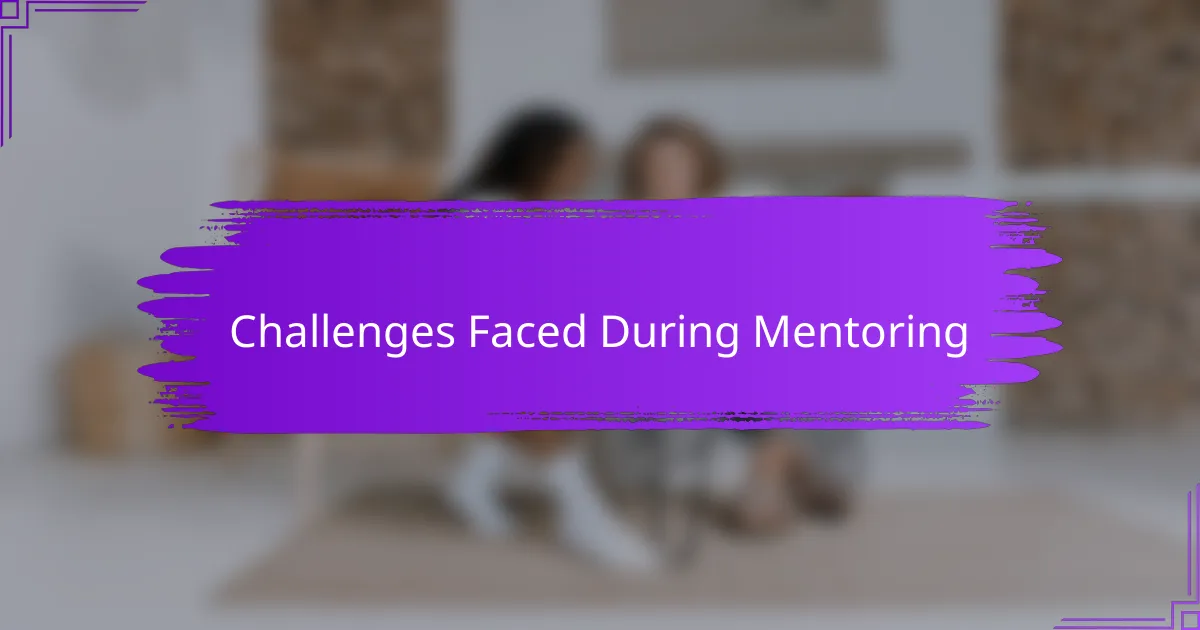
Challenges Faced During Mentoring
Mentoring youth in politics isn’t without its hurdles. I quickly learned that keeping young people motivated amid the often slow pace of political change can be tough. Have you ever tried explaining why persistence matters when setbacks make enthusiasm wane? It’s a delicate balance between encouragement and honesty.
Another challenge I faced was navigating the diverse backgrounds and perspectives youth brought to the table. I remember a moment when conflicting opinions sparked tension in a group session. Rather than avoiding it, I saw it as a chance to teach respectful dialogue—a skill as vital as any policy knowledge in politics.
Perhaps the biggest difficulty was managing expectations—both theirs and mine. Young mentees frequently dreamed big, sometimes without a clear sense of the obstacles ahead. How do you gently ground idealism while keeping that fire alive? It was a question I asked myself often, learning that patience and continual support are key ingredients in mentoring.
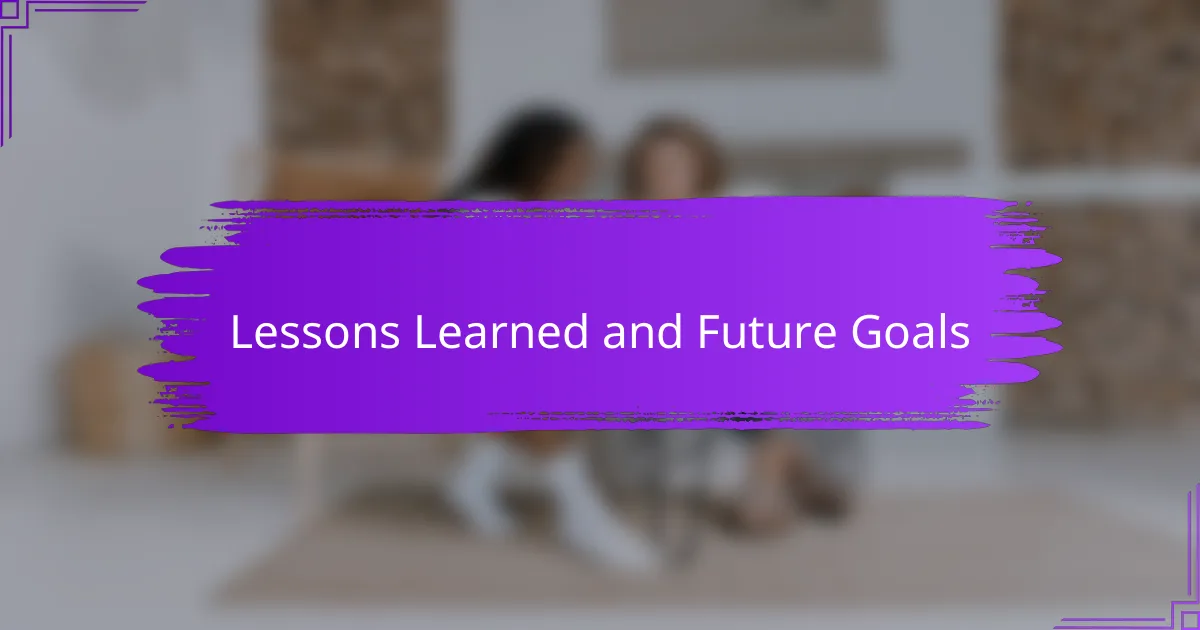
Lessons Learned and Future Goals
One lesson that sticks with me is the importance of patience. I used to expect quick results, but then I saw how trusting relationships and meaningful growth take time to develop. Have you ever felt the temptation to rush progress, only to realize that steady, consistent support builds deeper impact?
Looking ahead, I want to focus more on creating sustainable spaces where youth can lead confidently on their own. What if mentoring wasn’t just a guiding hand but a launching pad for future mentors? Empowering young people to become mentors themselves feels like the next step in nurturing a lasting political movement.
I also learned that flexibility is crucial. Each mentee brings unique dreams and challenges, and adapting my approach helps them thrive. Moving forward, I aim to refine this balance between structure and openness, so every young voice finds its place in the political conversation we’re building together.
